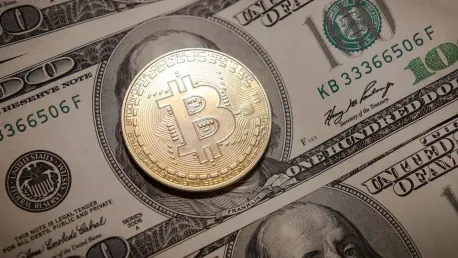As the intersection of politics and technology grows increasingly significant, the rise of cryptocurrency emerges as a captivating battleground. Former President Donald Trump’s recent endeavor into the digital currency market exemplifies this dynamic, but its success may very well hinge on surpassing the political and technological divides that characterize cryptocurrency adoption across the United States currently. The intricate landscape of this fintech venture is reflective of a broader narrative, where political leanings and local tech ecosystems may substantially influence the trajectory of Trump’s digital currency project.
The Political Divide in Cryptocurrency Interest
A groundbreaking study by the crypto shopping platform Zellix has shed light on the stark differences in cryptocurrency interest between Democratic and Republican-leaning states. By examining search volumes for terms like “Which crypto to buy today” and “What crypto will explode in 2024,” the study revealed that states with Democratic leanings exhibit significantly higher engagement with cryptocurrency. This disparity suggests potential obstacles for Trump’s cryptocurrency project, which primarily targets residents of Republican-leaning states.
Among the top ten states most fascinated by cryptocurrency, only three—Alaska, Florida, and North Dakota—voted for Trump in the 2020 presidential election. These states ranked fifth, sixth, and seventh in the study, respectively. On the other hand, traditionally Democratic states such as New York, California, and Washington demonstrate a robust interest in cryptocurrency. For example, New York stands out with 298.58 monthly searches per 100,000 residents, showcasing a direct connection between tech-savvy economies and elevated cryptocurrency curiosity.
Economic Conditions and Tech Adoption
The notable divide in cryptocurrency interest between Democratic and Republican states reflects not just political distinctions but also varying local economic conditions and political cultures. States with thriving and progressive FinTech environments, predominantly Democratic, are more inclined to embrace innovations in financial technology. Such states drive financial inclusion and promote digital services through blockchain technology, creating a conducive environment for cryptocurrency adoption.
Conversely, Republican-leaning states exhibit slower rates of adoption, potentially attributed to conservative financial practices and general wariness toward disruptive technologies. Trajan King, CFO at Zellix, commented on this regional disparity, noting that conservative states tend to show less enthusiasm for newer technologies, including digital currencies. This highlights the challenges Trump’s cryptocurrency project might face in gaining traction among its intended audience in these regions.
The Role of FinTech in Cryptocurrency Adoption
The presence of comprehensive FinTech ecosystems in Democratic states plays a crucial role in driving cryptocurrency interest. Major technology hubs in these states actively promote blockchain-based innovations, creating an environment that favors digital currency adoption. This trend aligns with the broader role of FinTech in the global economy, where digital currencies are increasingly being integrated into mainstream financial services.
As digital economies continue to explore and expand, cryptocurrency could become pivotal in emerging markets. Even conservative states like Florida and Alaska could represent untapped markets for digital financial services, provided that the necessary FinTech infrastructure and educational initiatives are established. This resonates with larger financial tendencies, wherein digital currencies are becoming essential in enabling a variety of services, from digital payments to decentralized financial solutions.
Strategic Implications for Trump’s Cryptocurrency Project
Research suggests that cryptocurrency adoption is notably more pronounced in progressive, tech-oriented states and less so in conservative regions. This scenario presents both significant challenges and unique opportunities for Donald Trump’s cryptocurrency initiative. The project’s success will likely depend on its ability to appeal to a more tech-savvy audience residing predominantly in Democratic states.
For Trump’s cryptocurrency project to thrive, it must navigate regional attitudes and align with the shifting demands of the crypto market within more receptive, Democratic-leaning regions. This might involve developing strategies that cater to the varying levels of demand for digital financial solutions between Democratic and Republican states. Bridging this gap may require concerted efforts in education and infrastructure development tailored to address the political and technological divides influencing cryptocurrency adoption.
The Future Dynamics of Cryptocurrency Proliferation
As the intersection of politics and technology becomes increasingly significant, the rise of cryptocurrency stands out as a fascinating battleground. Former President Donald Trump’s recent foray into the digital currency market epitomizes this dynamic. However, the success of his venture may crucially depend on overcoming the political and technological divides that currently shape cryptocurrency adoption across the United States. This complex fintech landscape mirrors a broader narrative where political ideologies and local tech ecosystems significantly impact the trajectory of Trump’s digital currency initiative. His project not only highlights the challenges inherent in merging politics and emerging technologies but also underscores the broader implications for how digital currencies are perceived and used across different regions of the country. The venture serves as a microcosm of the ongoing tug-of-war that characterizes the world of cryptocurrency, reflecting the varied and often conflicting interests that influence its development and acceptance.









